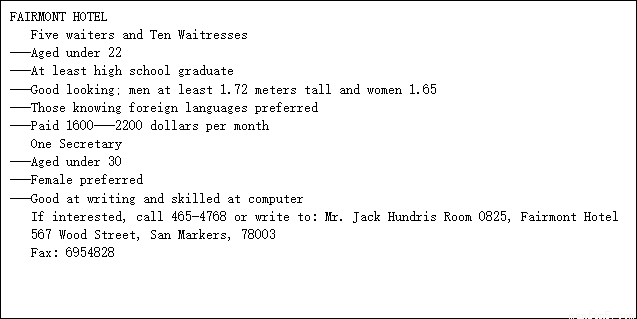��Ŀ����
��������ij����ѧ�����������к������ѧӢ��ķ�ʽ�ͳ����кܴ�ͬ������Լ���Ӣ������ʦд��һ���ţ������Լ���Ӣ��ѧϰ�����Ҫ�����������ݣ�
1����ʼѧϰ����Ӣ��ʱ������Ӣ��ȳ���Ӣ���Ѻܶ࣬����ɥʧ���ġ�
2��������ʶ��Ӣ�����Ҫ�ԡ�
3��ÿ��Ŭ��ѧϰӢ�
4������ʦ��ͬѧ��̸��õ�Ӣ��ѧϰ������
5������Ӣ��ȡ���˺ܴ��������Ӣ��Խ��Խ����Ȥ��
6���ŵĿ�ͷ��β�Ѿ�������
��ʾ������junior high school ����senior high school
������100��120��
Dear Mr.Li��
_________________________________________________________________________
_________________________________________________________________________
_________________________________________________________________________
Yours��
Li Hua
Dear Mr. Li��
I'm glad to tell you that I have made great progress in my English study since I became a senior high school student.
When I started senior English in the beginning, I found it much more difficult than what I learned in junior school and I almost lost heart. Later, I realized the importance of English, so I got up early every morning, recited English words, listened to English tapes and did a lot of exercises. I also asked my teachers and classmates for better ways of learning English.
Now, I'm improving my English greatly. And I'm getting more and more interested in learning it. Thank you so much for your great help in your class.
Wish you all the best.
Yours��
Li Hua
��������
�������������Ҫ���֪����������ij����ѧ�����������к������ѧӢ��ķ�ʽ�ͳ����кܴ�ͬ������Լ���Ӣ������ʦд��һ���ţ������Լ���Ӣ��ѧϰ���������Ӧ����һ������ʱ����һ�˳ơ�����100-120���ң���Ҫ̫���̫�١�������ʹ�ýϸ��Ĵʻ�Ͷ����Լ��̶���ʽ��ע�����֮��������ԡ�
������˵���� ��������һЩ���Ķ���;�ʽ���磺lose heart ��what�����ı���Ӿ䣬getting more and more interested in�ȶ��ܲ�����
���㣺���������ġ�

 �������Ӧ���⼯ѵϵ�д�
�������Ӧ���⼯ѵϵ�д� �ۺ��Բ�ϵ�д�
�ۺ��Բ�ϵ�д��������������������Ѹ�١����������ճ�̸������������ʱϲ��ʹ��ǰ�������ԣ��硰��ô�ˡ�������ľ�С��ȡ���һ�������������Ǽ���Ĺ�ע�����ۡ����������������ʾ����Ӣ��дһƪ���ķ�ӳ��������˹۵㡣
��ͬ | ����ͬ |
1. ʹ�Լ���ʱ�� 2. �����ҵ���Ȥ������ͬ������ | 1. ��ĸ�ͺ��ӹ�ͨ������ 2. ����ȷ������ʹ�ò���������ѧϰ |
ע�⣺1. ���¿�ͷ�Ѹ������������ܴ�����2. ������100�����ң�
3. �ο��ʻ㣺ʱ��fashionable����ͨcommunicate��
In recent years, Internet language has been updated faster and faster. Many young people like to chat in their daily talk and Internet chatting with these words such as ��zhong me le�� and ��you mu you��.
________________________________________________________________________
________________________________________________________________________
________________________________________________________________________
________________________________________________________________________
Want to find a job? Now read the following advertisements.

WILSON BOOKSTORE Accountant(���) ---Aged between 25 and 40 ---With an experience of at least two years ---With a degree and an accountant certificate(֤��) ---Paid 3000-4000 dollars monthly ---With a knowledge of computer Salesclerk ---Basic education of 12 years or more ---Good at computer ---Paid 1800-2200 dollars monthly Tel: 447-4398 Fax: 3485269 |
1.If you don��t know how to use a computer, you can just apply for the position as _________ .
A. a secretary B. a waiter or a waitress
C. an accountant D. a salesclerk
2.If you want to get the position of accountant in Wilson Bookstore, you have to satisfy the following conditions EXCEPT _________ .
A. being a woman
B. knowing well how to use a computer
C. having been an accountant
D. having an accountant certificate
3.If you want to try for a job in Fairmont Hotel, you _________ .
A. have to be a woman and know foreign languages
B. should be a university graduate
C. have to be taller than 1.72 meters
D. should be younger than 30 years old